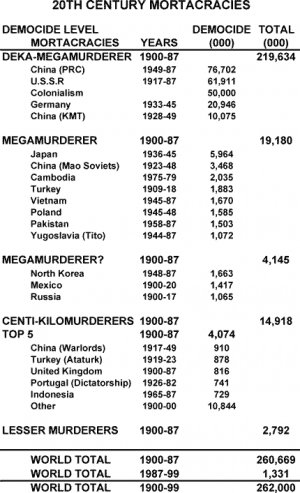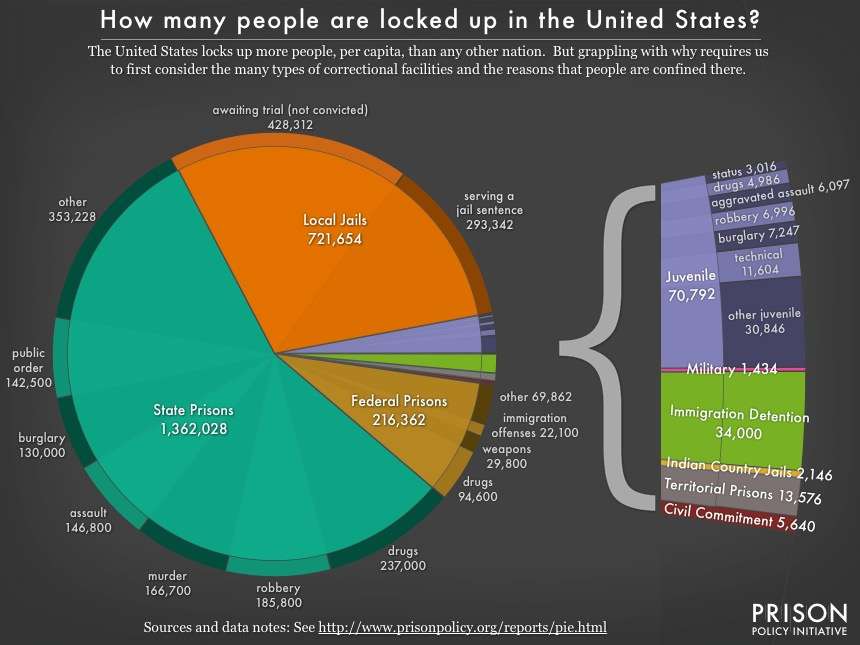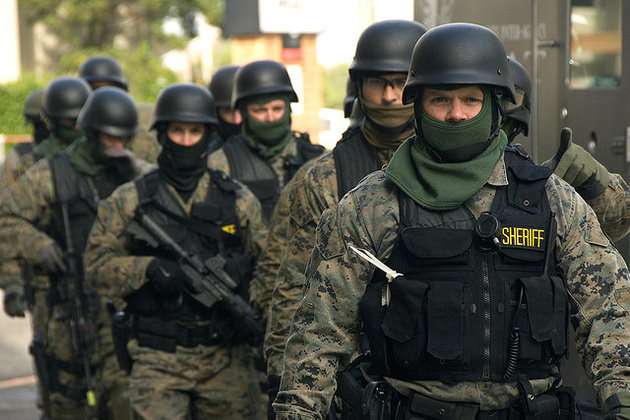
This Is the Number of Innocent People Murdered by Governments. Are You Anti-State Yet?
Being antigovernment is the logical result of taking a close look at the state and its bloody works.
People suspicious of coercive power have been on the defensive recently—or, more accurately, their opponents want them to be on the defensive. The latest argument spouted by fans of a government potent enough to give you all you could want and give it to you good and hard is that any eyebrows raised at the prospect of such an expansive state areevidence of racism.
Don't try to follow the logic; you might trip over the twists and turns it takes.
But here's the honest truth: Not just skepticism toward state power, but a strong antigovernment sentiment, are natural and logical results of taking a close look at the state and its works—its bloody, heavy-handed works.
Let's start with a number: 262 million. That's the number of unarmed people thelate Prof. R. J. Rummel estimated governments murdered in mass killings he termed "democide" during the 20th century. "This democide murdered 6 times more people than died in combat in all the foreign and internal wars of the century," he wrote.
Unsurprisingly, the bloodiest body count was run up by totalitarian regimes, though authoritarians were busy stacking up the corpses, too, if in smaller piles. Democracies were also responsible for unjustifiable deaths, especially in subduing resistance in their colonial possessions (think: Belgian Congo) and in indiscriminate bombing of civilian targets during wars (think: Hiroshima), but to a far lesser degree than Communists, Nazis, and overdecorated generalissimos.
Rummel's 1997 book, Power Kills, stated his case most strongly, but he nicely summarized the argument on his website:
It is true that democratic freedom is an engine of national and individual wealth and prosperity. Hardly known, however, is that freedom also saves millions of lives from famine, disease, war, collective violence, and democide (genocide and mass murder). That is, the more freedom, the greater the human security and the less the violence. Conversely, the more power governments have, the more human insecurity and violence. In short: to our realization that power impoverishes we must also add that power kills.
So, opposing accumulation of power by government—being antigovernment—may be inconvenient for some people's political plans, but it's also, literally, a life-saver. Liberal democracies seem to be the least murderous type of regime, but there's no obvious magic cutoff in terms of authority below which governments stop slaughtering people. So keeping any sort of government on a short leash is just good sense.
But ending up in a ditch with a few thousand other innocents to keep you company isn't the only way to experience an over-powerful state. Fans of active government want the state to flex its muscles in ways that they think will benefit society, but they ignore that such activism can easily overwhelm the ability to comply.
When Georgetown University bioethicist Lawrence O. Gostin cheers on former New York City mayor Michael Bloomberg's nanny-state meddling and writes, "the public health approach rejects the idea that there is such a thing as unfettered free will," he forgets (or doesn't care) that using the law to clamp fetters on us unhealthy saps creates more rules and regulations that we could ever possibly obey.
The conservative Heritage Foundation warns that "the number of criminal offenses in the U.S. Code increased from 3,000 in the early 1980s to 4,000 by 2000 to over 4,450 by 2008." Those laws, originally limited to obvious crimes, now touch on areas of life that most people would never guess to be of interest to prosecutors and law enforcement officers.
Civil liberties attorney Harvey Silverglate made a similar point in his 2009 book, Three Felonies a Day. He says that laws have not only proliferated, but they're applied in unpredictable and arbitrary ways, so that it's virtually impossible for Americans to avoid subjecting themselves to potential arrest, prosecution, and imprisonment. That's to say, you can break a law by accident, and end up behind bars.
And a lot of people do end up behind bars.
When Time magazine's Michael Grunwald huffs, "I guess you could call me a statist…we do need Big Government to attack the big collective-action problems of the modern world," he overlooks the ranks of those on the receiving end of that Big Government attack. Those who now fill the nation's jails, prisons, and detention centers, says the Prison Policy Initiative, number about 2.4 million people.
The International Centre for Prison Studies says that number ties the United States with Seychelles (which has been dictatorship-free for 22 years!) for the highest incarceration rate in the world, at 707 per 100,000 people. Pretty much everybodyelse throws a smaller percentage of their population in the clink.
But we have a lot of laws to enforce.
And those laws are enforced roughly.
Former Reasoner Radley Balko wrote 2013's Rise of the Warrior Cop to document the increasingly military-style weapons, attitudes, and tactics of the nation's police forces as they enforce those myriad laws and keep the prisons stuffed to the brim. Last year he wrote in the Huffington Post, "too many cops today have been conditioned to see the people they serve not as citizens with rights, but as an enemy."
Separately, the American Civil Liberties Union notes:
The police officers on our streets and in our neighborhoods are not soldiers fighting a war. Yet many have been armed with tactics and weapons designed for battle overseas. The result: people – disproportionately those in poor communities and communities of color – have become targets for violent SWAT raids, often because the police suspect they have small amounts of drugs in their homes.
Even elements within the U.S. Department of Justice fret that sticking cops "in black battle dress uniforms" is "creating barriers between the police and the community."
Fans of big, intrusive government—at least, the non-monstrous ones—will argue that they didn't mean to do it that way. They just want to make some improvements, regulate away evils, and imprison bad huys. Just let them get it right…
But none of this is new. In 1844, Ralph Waldo Emerson cautioned:
Republics abound in young civilians, who believe that the laws make the city, that grave modifications of the policy and modes of living, and employments of the population, that commerce, education, and religion, may be voted in or out; and that any measure, though it were absurd, may be imposed on a people, if only you can get sufficient voices to make it a law. But the wise know that foolish legislation is a rope of sand, which perishes in the twisting.
Much influenced by Emerson, and anticipating Rummel by over a century, Henry David Thoreau commented, "'That government is best which governs least'…Carried out, it finally amounts to this, which also I believe, — 'That government is best which governs not at all.'"
After reviewing the evidence of what government does and the mess it leaves in the process, that's a good rejoinder to those who would expand the state into every nook and cranny of our lives, imposing more regulations than we can count, enforcing them with armies of goons, imprisoning those who resist—and, inevitably, stacking the bodies high as government accumulates and wields new power.
It's just good sense to be antigovernment, when the alternative is so unacceptable



